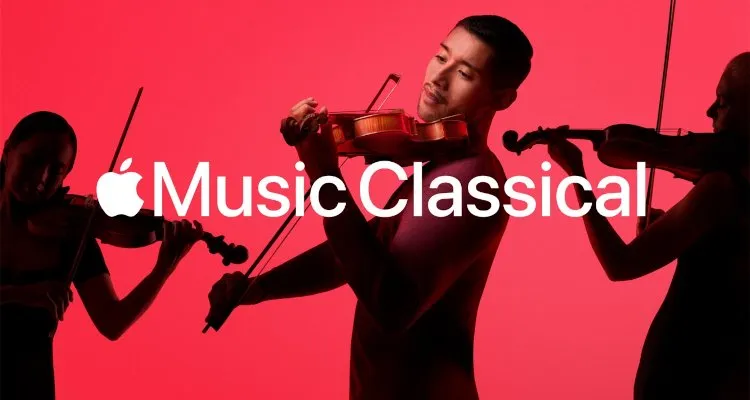Photo Credit: Apple
Nearly two years after Apple revealed plans to roll out a classical music service, the standalone streaming platform has officially become available for download.
The Cupertino-headquartered company, which bought Primephonic back in 2021, touted the formal launch of Apple Music Classical (AMC) via an announcement message this morning. Besides reiterating already-disclosed details – including the classical music offering’s availability, pricing, library size, features, and more – the iPhone developer’s latest release has shed light upon additional AMC specifics yet.
To recap, Apple Music Classical is available free of charge to all Apple Music subscribers (excepting those who have the $4.99-per-month Voice Plan) in most markets where the latter operates. However, higher-ups previously indicated that AMC wouldn’t arrive in China, Taiwan, South Korea, or Japan off the bat, and this list of excluded nations now includes Russia and Turkey as well.
Plus, only iPhones running iOS 15.4 (the oldest such device reportedly being the 6s) will support Apple Music Classical. Equipped with an over five-million-track library, according to Apple, AMC is said to boast “thousands” of exclusive albums, original artwork (playlist covers, composer portraits, etc.), north of 700 expert-curated playlists, and more. (Be sure to check out our comprehensive guide for further information about these and other topics.)
Regarding the just-unveiled AMC details, the platform encompasses a “hand-picked Editor’s Choice curation” designed to introduce new listeners to the world of classical music, Apple relayed. Additionally, “The Story of Classical” audio guides “blend expert commentary and selected works to introduce key composers, periods, instruments, and classical terminology,” per the company.
Meanwhile, AMC is said to afford classical music diehards “the chance to go behind the scenes of selected recordings as leading classical artists offer track-by-track audio commentary,” whereas “Hidden Gems,” as the name suggests, aims to connect fans with select lesser-known works.
Finally, in terms of the nuances of Apple Music Classical, the streaming service has partnered with the Berlin Philharmonic, Carnegie Hall, the Chicago Symphony Orchestra, the London Symphony Orchestra, the Metropolitan Opera, the New York Philharmonic, and a number of others, according to Apple. These partnerships are expected to deliver “new, unique, and exclusive content and recordings at launch and beyond.”
Addressing the debut of AMC in a statement, violinist Hilary Hahn acknowledged the importance of the platform’s seemingly comprehensive (and accurate) metadata.
“I know that I can trust Apple Music’s natively high-quality uncompressed audio to convey the subtleties of my performance, my instrument, and the space in which it’s played,” said Hahn, who released her newest album via UMG’s Deutsche Grammophon. “And even a solo classical recording is a deeply collaborative process; Apple Music Classical’s extensive metadata ensures that everyone – composers, arrangers, conductors, musicians, producers, publishers, and more – gets the credit they deserve.”
And in remarks of his own, Gordon Getty emphasized the perceived significance of Apple Music Classical’s custom-developed search capabilities.
“Music is the focus of my life, and as a composer and supporter, I have long believed it is essential to our humanity,” communicated the 89-year-old. “The advent of Apple Music Classical is an extraordinary moment in our profession. It is an exceptional streaming service that celebrates diverse artists, embraces legendary recordings, and inspires curiosity in all of us. Apple has created a unique experience worthy of our passion, and I am confident it will advance the cause of music for generations to come.”

